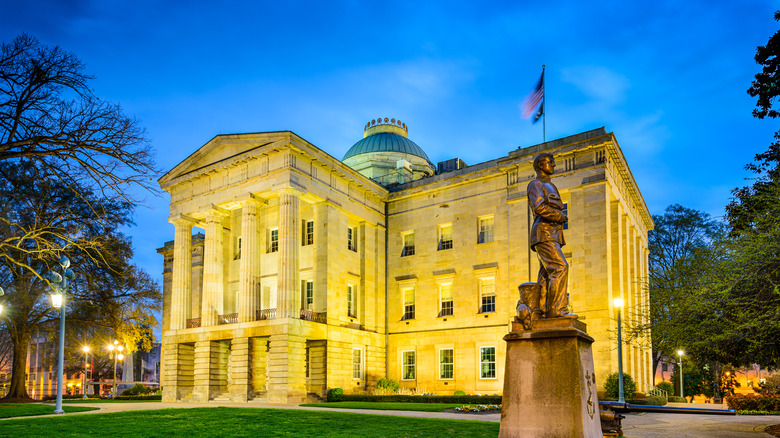Weirdest Laws In North Carolina
North Carolina is a captivating place to behold. Abundant with vast marshlands, coastal towns, and smoky mountains, this state is a staple of the outdoors (via Britannica). Whether you come for the expansive mountain views and winding walking trails, or you're just sweet on the Krispy Kreme donuts, there is one noteworthy element of North Carolina that's not immediately visible to tourists — it's the wacky legislation that you might not know.
As it turns out, the whole of the United States has some pretty bizarre laws on the books and the Old North State is no exception. These weird laws range from prohibitions on elephants in the fields and masks in corporate meetings to even the most mundane things like kitchen grease and rollerblading regulations (via Only In Your State). These laws while odd, speak volumes of what the local legislators have been up to.
It is illegal to hold a meeting while wearing a mask
Everyone who held a masked business meeting in North Carolina during the Coronavirus pandemic violated statute § 14-12.8. That's because NC General Statutes states "No person or persons at least 16 years of age shall while wearing a mask, hood or device whereby the person, face or voice is disguised so as to conceal the identity of the wearer, hold any manner of meeting."
Prior to the international health crisis known as COVID-19, such a description of masked meetings was mostly reserved for comic book supervillain gatherings and the likes. So, what exactly were the North Carolina legislators thinking when they drafted up this crafty law? Were they trying to prevent fictitious criminal masterminds like Mumbles, Pruneface, and the Joker from pulling off their cynical plots? The surprising answer is — sort of.
This weird law can be located in Article 4A under the title "Prohibited Secret Societies and Activities". As you might have guessed, these superhero-esque legislators were trying to rid the world of anonymous members of secret societies who might be gathering in the spirit of a world takeover. This leads to the second weirdest law.
No joining any secret societies
You might be able to gain the whole world at the price of your soul in other places but you better not try that in North Carolina. Here, it is strictly against the law. If you know what's good for you, you'll leave your Illuminati membership card and matching Mason's garb at home when you cross the state line, because secret societies can't so much as whisper in the Old North State.
Anyone who doesn't believe such secret societies exist might just want to take a glance at NC General Statutes Article 4A to find that there is an entire legislative chapter dedicated to their prohibition. According to the text "secret political societies," "secret military societies," and various other shadowy crews are banned from all illicit, secret-society-related activities. This extends far beyond mask-wearing and into the bounds of secret handshakes, extrajudicial oaths, secret solemn pledges, hoods, voice devices, costumes, and intimidating exhibits. This is a great example of when weird laws cross over into creepy territory.
Do not borrow your neighbor's animals
Borrowing your neighbor's animals is not considered horseplay in the state of North Carolina. In fact, according to Justia US Law, it's technically a Class 2 misdemeanor. Not to get carried away but if you haul off with a neighbor's possession and intend to make temporary use of it, that item had better be a cup of sugar. Most other possessions are completely off legal limits.
This particular statute, § 14-82, means that borrowing your neighbor's dog, mule, horse, gelding, or mare, falls under the general banner of larceny. That's certainly no light crime, especially if the dog is heavy. While most would agree that this practice is unexpected, the fact that it's unlawful is rather strange. The law does go on to state that it is illegal to borrow such animals secretly or against their owner's will, which is a bit more understandable. However, a closer look at North Carolina law seems to imply a thing or two about the general attitude towards neighbors.
Stop swiping used kitchen grease
If you're like most, the thought of borrowing your neighbor's dog has never even crossed your mind. But there is one thing you've really got your sights set on and that's your favorite restaurant's sweet, delicious, used kitchen grease. You know you can find the stash, but before you sneak in to collect the oily, messy commodity, think twice.
Stealing kitchen grease became such an issue that in 2012 it became a punishable crime in North Carolina, according to WRAL. The legal text (via Justia) is as slippery as the grease itself. For example, if you steal $1,000 or less of said grease, you're looking at a misdemeanor. However, if you manage to lug out more than $1,000 worth of the stuff, you are officially a North Carolina felon. WRAL reported used kitchen grease can garner 30 to 40 cents a pound and its repurposed into things ranging from cosmetic products to biodiesel.
Climate change science as a sea level rise indicator is now prohibited
While laws like no plowing cotton fields with elephants or rollerblading in the sun (via Only in Your State) are generally outdated bits of legislation no longer enforced, here's a newer law that's equally perplexing. According to Charlotte Stories, a recently passed bill known as NC House Bill 819 is stirring up all sorts of controversy with its anti-climate change stance.
In brief, this bill prohibits using climate change science as an indicator of sea level rises. It also puts all sorts of restrictions on data gathering with regards to sea levels and other factors indicative of climate change. Critics of the bill claim it "defies science" and prioritizes profits over the planet (via Columbia Undergraduate Law Review).
If you've read these laws and wondered whether the state legislators were sniffing glue when they came up with some of these weird laws, know this. If they were, they were breaking their own laws as glue sniffing is also highly illegal in certain parts of North Carolina under the North Carolina Toxic Vapors Act.





